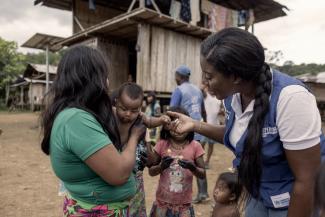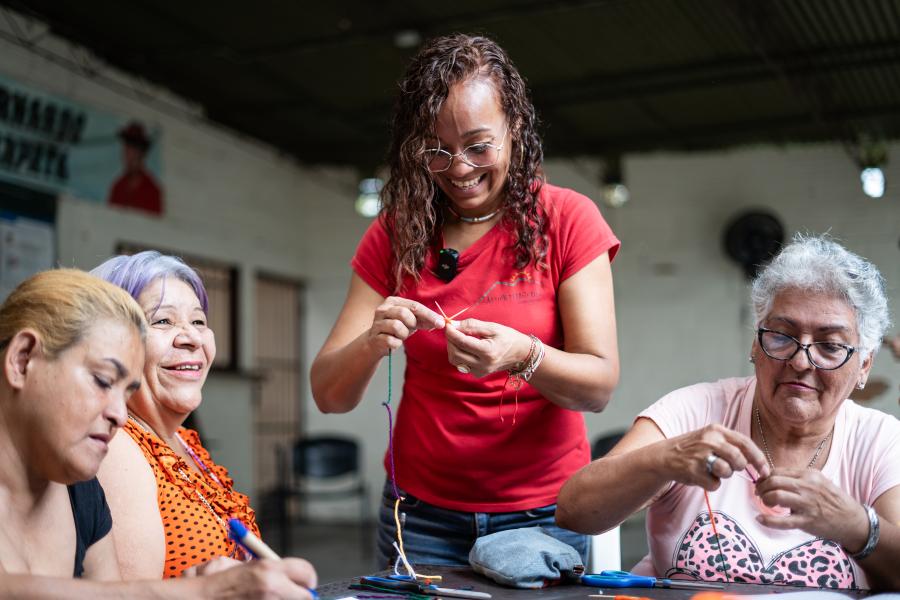2023 situation overview
Colombia remained at the centre of multiple and overlapping displacement situations in 2023. The number of internally displaced people reached 6.9 million. At the end of 2023, Colombia hosted the third largest population of refugees and other people in need of international protection worldwide, including 2.9 million Venezuelans and more than half a million Colombians who had returned after previously seeking asylum in the Bolivarian Republic of Venezuela.
By the end of 2023, there were 113,500 refugees and 299,500 asylum-seekers from Colombia worldwide. The vast majority – 95% of refugees and 71% of asylum-seekers – were hosted in the Americas. The largest number of Colombian refugees were in Ecuador, hosting 59,500, the Bolivarian Republic of Venezuela with 29,200, and Canada with 7,000. More than half the Colombian asylum-seekers – 178,750 – were in the United States, and another quarter (76,500) were in Spain.
Despite confrontations between some armed groups as they looked to expand territorial control, the Government continued negotiations with various non-State armed actors under the “Total Peace” policy, a plan to sharply reduce violence in the country through dialogue.
Displacement and confinements continued to affect significant swaths of Colombia’s territory in 2023, and UNHCR considered that certain profiles of asylum-seekers from Colombia may need international protection as they risked persecution in line with the criteria established under Article 1A of the 1951 Convention. In August 2023, UNHCR updated the “International protection considerations with regards to people fleeing Colombia”.
Mixed movements of refugees and migrants passing through Colombia dramatically increased in 2023, with over 520,000 refugees and migrants crossing towards Panama through the Darien jungle by foot, primarily nationals of Venezuela (63%), Ecuador (10%), Haiti (9%), and China (5%), but also another 100 countries. This represented a doubling of arrivals in Panama compared to 2022 and by far the greatest number of people ever making the trek.
Colombians also continued to leave their country and seek protection in Ecuador. Despite Ecuador’s deteriorating security situation in 2023 (leading to a state of emergency and declaration of an internal armed conflict in 2024), Colombian nationals filed 3,983 new asylum claims in the country.
UNHCR supported Colombia’s institutional response to displacement by fostering a network of protection actors, strengthening institutions, and prioritizing solutions through the legalization of informal settlements with high concentrations of internally displaced people as well as community empowerment.
In 2023, 2,800 people benefited from legalization while another 3,208 people in these settlements received land titles.
UNHCR also engaged within the framework of the Secretary-General’s Action Agenda on Internal Displacement, through the creation and co-leadership of the Solutions Steering Group, as well as an Internal Displacement Solutions Fund to support the national Government in defining and implementing a long-term strategy, including progress indicators and new funding sources.
UNHCR’s close work with IDP communities enabled it to contribute meaningful insights to enrich the State and civil society’s understanding of the IDP situation and to identify areas requiring heightened attention. Also, the Constitutional Court, supported by UNHCR, renewed its monitoring of the “unconstitutional state of affairs” regarding internal displacement.
UNHCR directly assisted over 638,000 people in Colombia in 2023, including refugees and migrants, internally displaced people, returnees, and people at risk of statelessness. This total included more than 230,000 people who were provided information on access to rights and services.
UNHCR worked with partners to improve the national humanitarian situation. For example, in Antioquia – a crossroads where refugees and migrants gather on their way towards crossing the Darién – UNHCR offered support through the Information and Orientation Centres, providing accommodation assistance, humanitarian transportation, and water, sanitation and hygiene services. Water purification tablets were distributed to over 574,000 people, and mental health and psychosocial support services were delivered to 1,657 people. Access to rights and services, including legal and socioeconomic integration of Venezuelan refugees and migrants, Colombian returnees and internally displaced people was fostered through the joint initiative INTEGRATE, supported by the local governorships, USAID, UNHCR and IOM.
During 2023, UNHCR referred 2,076 Colombians for resettlement to the United States of America, 167 to Canada, 44 to Australia, 119 to New Zealand and 3 to Finland. 1,945 Colombians departed from Ecuador, 358 from Colombia, 61 from Peru, 25 from Curacao, 8 from Panama, 8 from Mexico, 3 from Guatemala and 1 from Costa Rica.
Outside Colombia, UNHCR worked with partners and national and local governments to deliver protection and solutions to Colombian refugees and facilitated access to asylum procedures for those in need of international protection. In addition, UNHCR and partners strengthened and supported the local integration of refugees with peaceful coexistence projects that enhanced their socioeconomic inclusion. For example, in Ecuador, UNHCR and partners registered over 60,000 forcibly displaced and stateless people (20% of them Colombians) and provided them with services and assistance.
Under a work plan developed with the Government of Colombia for 2021-2024, UNHCR’s key partners included the Constitutional Court, the Victims Unit, the Special Jurisdiction for Peace, the Ombudsperson’s Office, Migration Colombia, the Foreign Ministry, and various line ministries, as well as an extensive network of authorities at the local level across the 24 departments covered by UNHCR in Colombia. UNHCR also aligned its work with the UN Sustainable Development Cooperation Framework (UNSDCF) for 2020-2023.
Similarly, for the humanitarian response for IDPs, UNHCR co-led the national Protection Cluster together with the Norwegian Refugee Councill and the Danish Refugee Council, and contributed to the implementation of the Humanitarian Response Plan in Colombia that supported 388,000 people at risk or affected by conflict and climate change.
Colombia was a co-convener of the second Global Refugee Forum (GRF) held in December 2023, where it took part in a multistakeholder pledge to mark the 40th anniversary of the Cartagena Declaration on Refugees, in which countries in Latin America and the Caribbean committed to establishing a roadmap to strengthen the humanitarian response and comprehensive solutions for populations in countries of origin, transit, and destination over the next decade.
Despite appeals for funding from a diverse range of donors, particularly the private sector and Government entities, UNHCR lacked the resources to respond adequately to key developments in Colombia, including large-scale movements of people across the Darien and new displacements along the Pacific coast. Underfunding also affected critical aspects of UNHCR’s support to communities who fell victim to the armed conflict, particularly indigenous and Afro-Colombian communities, which were disproportionately affected by internal displacement and confinement.
UNHCR also faced funding shortages in other countries affected by displacement from Colombia. In Ecuador, for example, UNHCR had fewer resources to support increased numbers of Colombians arriving with difficult and complex protection needs who required asylum or other types of solutions, such as access to a registration and regularization process spearheaded by the Government of Ecuador and supported by UNHCR.
Financial overview
More contributions information on previous year: Funding Update 2022
Colombian lawyer puts life on the line to serve communities under threat
By Jenny Barchfield in Bellavista, Colombia
Raised in displacement, Yaselly Martínez Ortiz now works to help Colombian communities affected by the country’s armed conflict. As soon as Yasselly Martínez Ortiz accepted her position as a civil servant in the remote Chocó area of Colombia, a life insurance policy was taken out in her name.
Read the story

